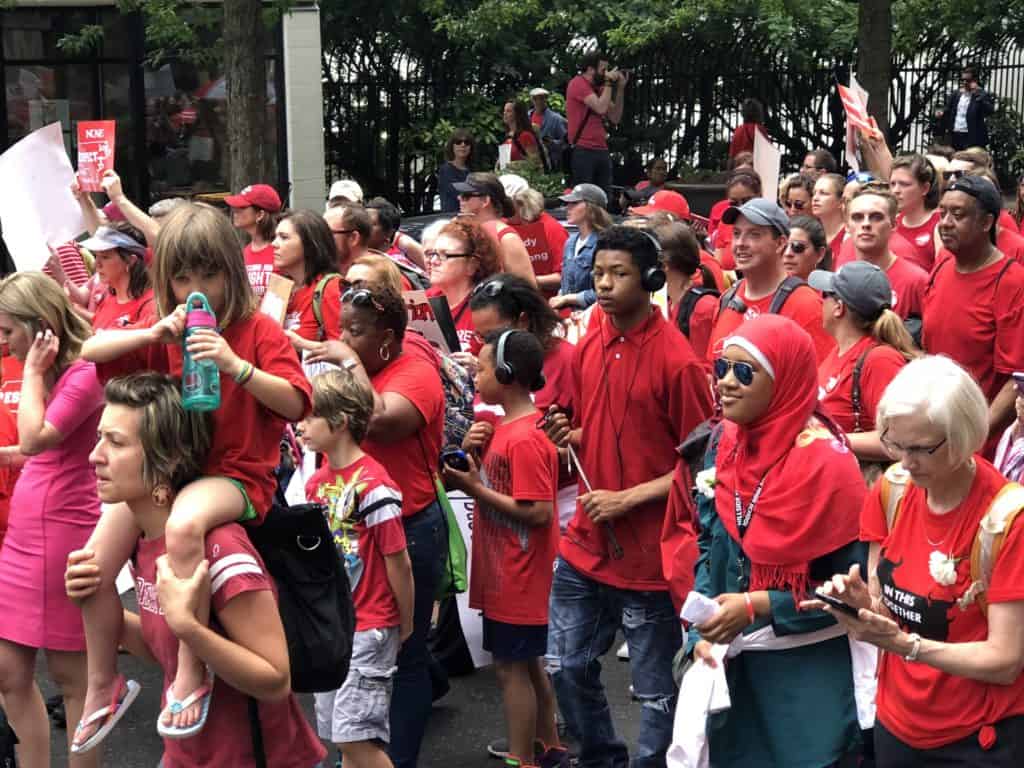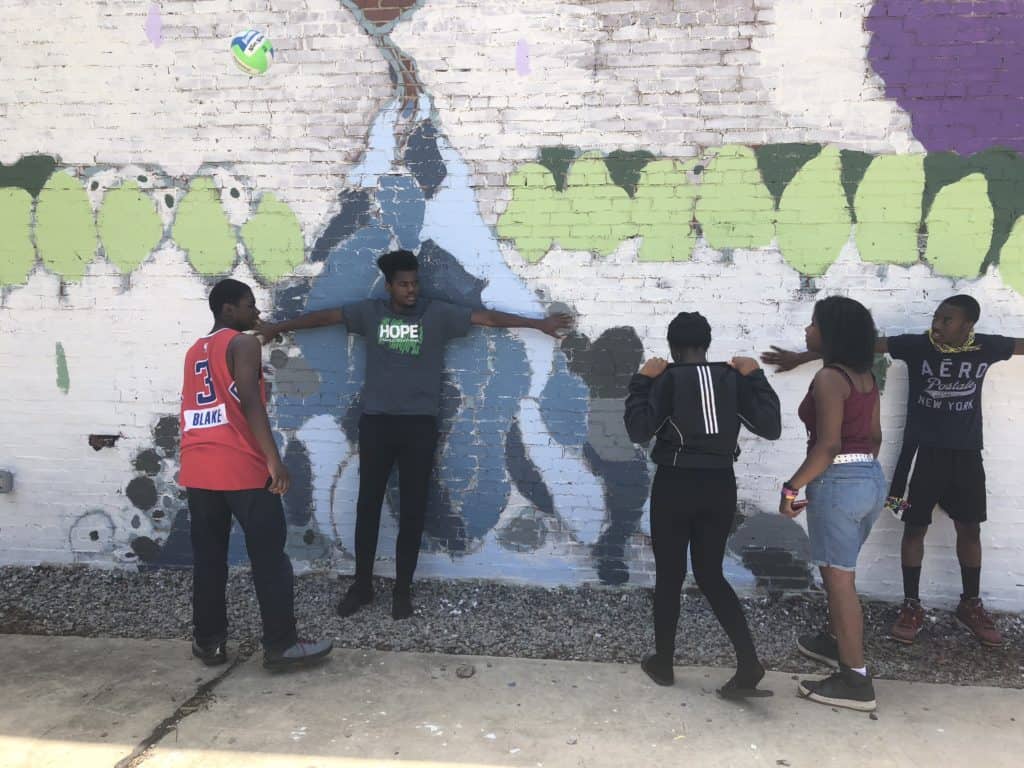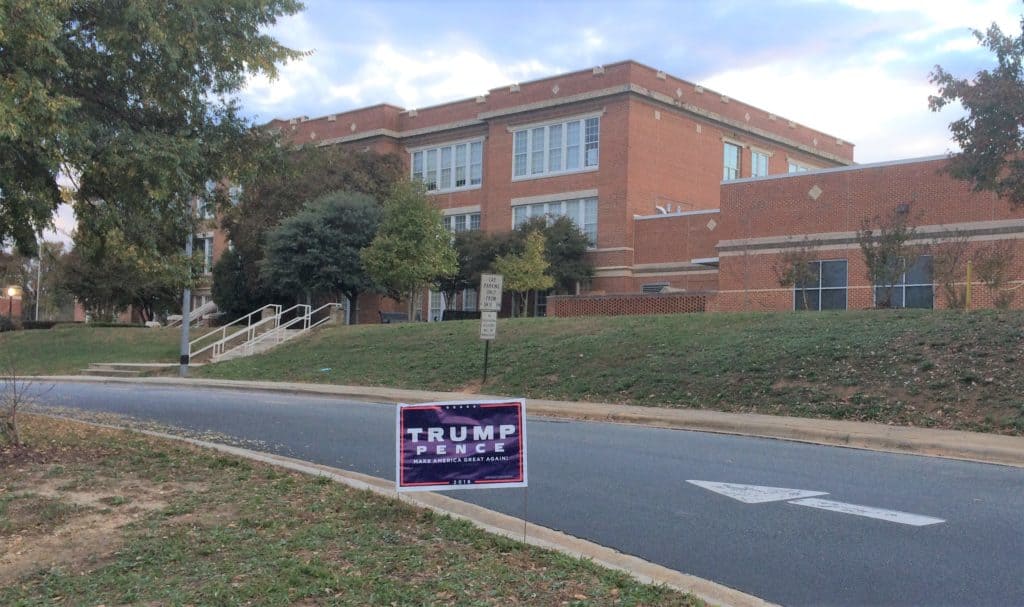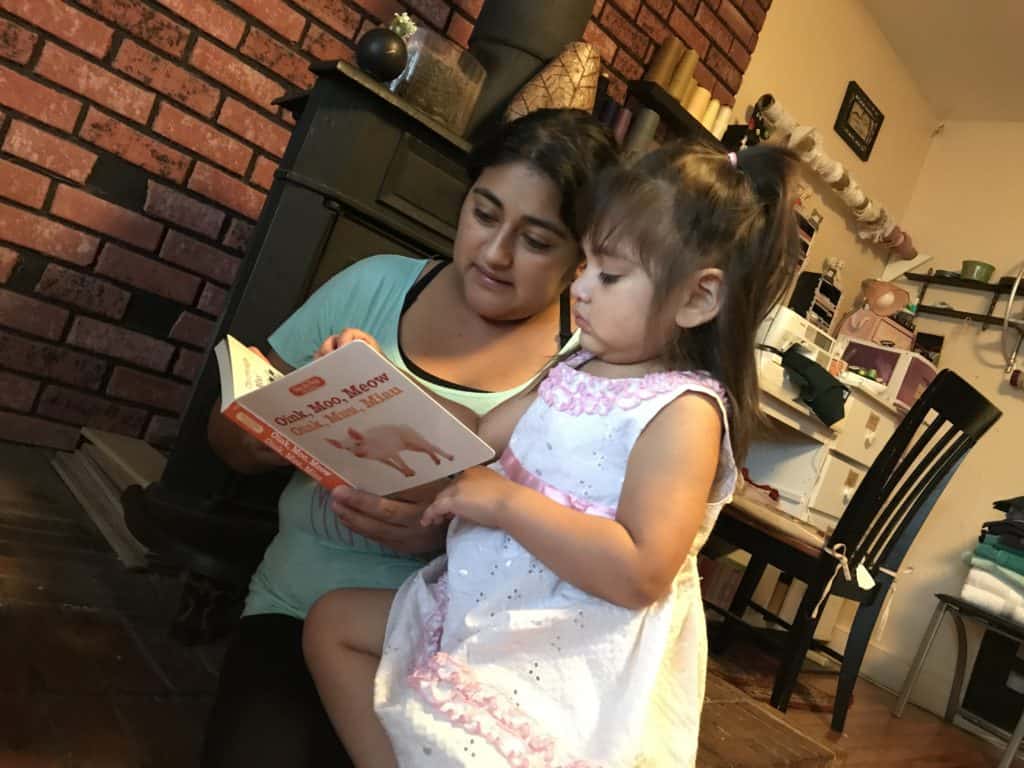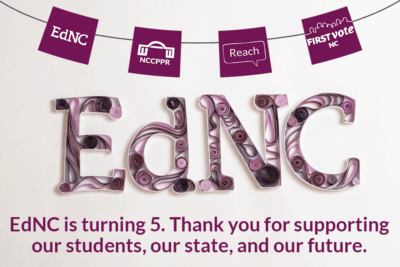

When was the last time you slowed down, stopped, took three steps back, and created the space for yourself to think about what it means to live well?
Do that with me now please.
As we think about our work at EducationNC over the past five years, much of our conversations have centered around the Aspen Institute’s Executive Seminar on Leadership, Values, and the Good Society. I’ve been through the program, and so have Molly Osborne, Nancy Rose, and Tracey Greene-Washington on our team.
We learned to think intentionally about how we connect the leadership of our self, the leadership of our organization — for us this is EdNC, but it can be your family, your neighborhood, your community, your civic organization, or your work — with the leadership of our society.
Connecting leadership across all the parts of our lives was inevitable for us at EdNC. Much of how and why we do things is born of loss — the loss of Nation Hahn’s beloved wife, Jamie Kirk Hahn.
In this article in Fortune about Nation, “When grief and work mix, there are no easy answers,” he says, “I was able to finally find a work project that felt both connected to the issues that Jamie and I cared about but also felt like something I could make my own.” Nation adds that his role and leadership at EdNC is “also something that could be shaped profoundly by the experience of grief.”
Let’s just start. Think for a minute about who you are. This is a good exercise to help you get below the surface. Have someone ask you over and over again who you are. Here, two of our school leaders demonstrate.
I am the CEO and editor-in-chief at EdNC. I am a mama. I am a daughter. I am adopted. I am a lawyer. I have traveled to more than 30 countries. I am fiercely unaffiliated. I am white. I am a Tar Heel. I live with congestive heart failure. I am in the business of hope.
Now think about all of the roles you play and how they show up in how you think about yourself. We learned this exercise at a thrive retreat with Blue Cross and Blue Shield of North Carolina.
We are children and we are parents, we are workers and we are leaders, we are friends and we are colleagues. The list goes on and on.
Think about the significance of each role to you, and then think about the significance of each role relative to how much time and energy you spend on it.
And then ask yourself, where do you rank? How do you prioritize care of yourself and time for yourself among all of the roles you play each and every day? My boys would note that this is a do-as-I-say-not-as-I-do sort of question.
Leadership begins with self-knowledge and self-care. The Aspen Institute says, “the kind of self-knowledge, perspective, and courage necessary for making decisions that uplift, rather than diminish, our humanity.”
And then we connect that leadership of the self with leadership of our families, our neighborhoods, our communities, our organizations — the fabric of the world as we know it and as we live it.
When I was little, I dreamed of building the perfect world, something like how I imagined Atlantis, which I was convinced still existed somewhere off the coast of North Carolina.
But life is complicated and hard and messy, and along the way I figured out that utopia is not about perfect. This poem by Wislawa Symborska — a woman, from Poland, a poet, a winner of the Nobel Prize — is about an island where all becomes clear and everything is as it should be. There is a cave where meaning lies and all the secrets of the world echo about. And yet all the footprints on the island lead back to the sea, back into “unfathomable life.”
It took me 30 years to realize and learn that leadership is not about imagining the perfect world or building Atlantis or utopia. Leadership is about the problems we face now — in our own own lives and the lived realities of others, in our neighborhoods and communities, in our cities and states, across our nation and the world — and the hope our collective leadership engenders and empowers in expecting a better tomorrow.
When it comes to leadership, my brother has as good a strategy as any. Jim is an actor. He lives in LA. You’ve seen him on That ’70s Show and know him as Dean Pelton on Community. You’ve seen him in the movies, including his own, The Way, Way Back. Right now he’s out at the Sundance Film Festival, premiering his next film, Downhill.
Jim won an academy award for the first screenplay he ever adapted — The Descendants. Jim had never written a screenplay before. He didn’t know how.
When it comes to leadership, Jim says, just start. Change management and systems change start by taking these big vexing problems we face, and figuring out how to just start. Write one word. Write one sentence. Ask someone how to do it. Find a muse. Find an editor. Don’t stop choosing to just start.
Then, he says, find your bliss. What feeds your soul? I can promise you aren’t going to do your best work unless at least part of what you do feeds your soul. Jim learned real quickly out in LA that waiting tables does not feed his soul. And so he started taking improv classes, and he started laughing, and he found his way into his career.
And then, my wise little brother counsels, embrace the power of I don’t know. What are your personal and professional strategies when you need help? All of the really important leadership challenges we face are too big for one person or one organization — it’s an all of us. Who is in your all of us? Who is in your posse, your kitchen cabinet? Who will be your lifelong mentors?
The Aspen Institute then asks us to connect leadership of the self and leadership of the organization to leadership of society — what does it mean to live well and lead in this time in this place? In 2020?
Our state has been the love of my life. I love all of it — all 100 counties from the 23 that voted 70+ percent for President Trump, to our urban blue crescent from Raleigh through the Triad to Charlotte, and all of the very purple counties in between.
My job is to keep people talking across all of the lines of difference in our state — race and ethnicity to be sure, but also sexual orientation, rich and poor, old and young, urban and rural, conservative and liberal, Tar Heels and not-from-heres.
I started working at the nonpartisan North Carolina Center for Public Policy Research in 1994. It was my first big job after law school. Remember the elections of ’94 — Republicans won 92 of the 170 seats in the legislature? One of the first articles I wrote for the Center was about the evolution of party politics, and I asked whether the wins were reactionary — anti-Democrat, anti-tax, anti-big government; revolutionary — a changing of the guard from Democrats who governed for most of the 20th century to Republicans who were hoping to govern for much of the 21st century; or evolutionary — a single step towards becoming a competitive, two-party state.
In many ways, we are still as a state trying to figure out where we are in this evolution, and the elections in 2020 will become an important part of our state’s story.
The 2020 elections matter. It’s a 10 year election, and my boss for most of my career, Ran Coble, tells people to remember the 4Ms. The party that wins the majority will draw the maps, raise money, and build momentum. These elections and the census will shape the next decade at the local, state, and national levels of government, framing in important ways life as we experience it day to day.
Across North Carolina, 2.5 million registered voters are Democrats, 2.3 million are unaffiliated, and 2 million are Republicans.
Despite the headlines, I don’t think the evolution of party politics is really the biggest driver of change in North Carolina.
Two business principles are at play in policy and politics — availability and confirmation bias. People base their perceptions on information that is easiest to come by — that’s availability. But availability is complicated by confirmation bias. People seek and consume information that confirms what they want to believe.
Changes in communication patterns and the consumption of information is changing life as we experience it, including who we associate with, who we listen to, and who we trust.
Think about how you use your phone compared to 10 years ago, compared to 20 years ago.
This idea of connecting leadership of the self, leadership of the organization, and leadership of society can be applied to any issue area. Mine happens to be education.
Jeremy Anderson, president of Education Commission of the States, says in states where leaps and bounds are being made, leaders have found ways to work across difference. “It’s a simple litmus test,” he says. “Can the people who can move this policy meet for coffee even if they disagree and talk through some of these differences?”
Darren Walker, the president of the Ford Foundation, also reminds us of the importance of building bridges and strong, working relationships based on mutual understanding in this essay, “In defense of nuance.”
So as I travel our state, I notice whether people are having coffee. Not so much, y’all — especially if it involves people who don’t think or look like us.
My favorite day at EdNC, I had coffee with Andrea Dillon, who you may know as Lady Liberty, in the morning and ended the day with a drink with Tom Lambeth, who has spent much of his career working on the left end of our political spectrum. I learned a lot.
I like to believe that if Governor Cooper and Senator Berger made it a priority to start each day having coffee together, we might just have a budget.
It’s over coffee that we can turn the complicated and the complex into the possible and hopeful.
And we’ve got some complicated and complex issues we need to tackle, like governance and accountability, which need to be addressed if we really want the systems change that will lead to readiness and attainment.
Ask yourself, “Who is in charge when it comes to education in North Carolina?” We have the governor, the Governor’s Education Cabinet, the legislature, the UNC system with 17 campuses, the community college system with 58 campuses, 36 more independent colleges and universities, the State Board of Education, the Superintendent of Public Instruction, the school boards and superintendents in 115 school districts, 198 charter schools with 12 more on the way, and 100 county commissions that fund local education. And then there is the federal government.
When it is not clear who is in charge, it is not clear who is accountable.
Complicated and complex indeed — and so we need leaders who are able to intentionally connect leadership of the self with leadership of the organization with leadership of society.
You see the voices of those leaders connecting practice to policy in EdNC’s perspectives.
You see it in the work of a cohort of TFA alums in Edgecombe County who are connecting the dots between their own leadership, leadership of their classrooms and schools, leadership in their community, and beyond.
To sustain and build the momentum for real change, I use a recipe I learned from a thinker up in Philadelphia:
- Test your assumptions about the nature of the problems
- Create learning environments that are safe and challenging in our schools, organizations, and communities
- Build relationships that breed trust and collaboration
- Examine problems from a range of diverse and inclusive perspectives
- Use data and creativity to cultivate and drive innovation
Let’s circle back to the leadership of the self.
I worry a lot about the intergenerational transfer of knowledge, and I encourage all of you who are mamas and dadas to think of raising your children as raising the leaders of our future. Kahlil Gibran says, “your children are not your children, they are the sons and daughters of life’s longing for itself.”
If we model three principles of democracy in our homes and then in our organizations, we will find them in play in society — voice (who has it and who doesn’t), power (who has it and who doesn’t), and respect (who has it and who doesn’t).
The Jewish way of Mussar and everyday holiness requires leaders to assess if their leadership is taking up an appropriate amount of space. This exercise cuts straight through the common roadblock to change created by turf but also allows leadership to flourish all around us.
So at the beginning of this very important year, what leadership role will you play, will you choose? 2020 matters. Just start.


